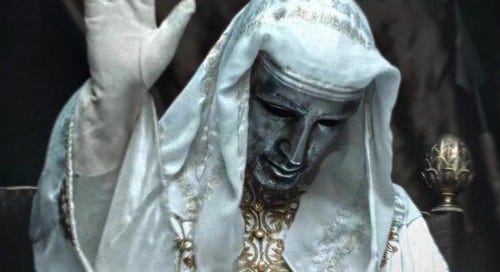Hello loyal readers! Thank you again for tuning in. This time, I found some new material by the fantastic writers of Substack to recommend you all.
Like last time, I will showcase a short story, an article, and a new poem.
If you haven’t seen the first edition, be sure to check it out as well!
As a reminder, your feedback is critical to the success of Thunderous Fantasies. Be sure to check the link here for a survey so I know what kind of content you like to see.
https://thunderousfantasies.substack.com/survey/1996110
Breath in the Stone
The short story I will be recommending has this grimdark war tale vibe I feel is a unique take on the fantasy genre. “Breath In the Stone” by
stars a wounded priestess who struggles finding refuge in a necropolis away from a demonic incursion. In spite of her efforts, she still faces harrowing threats, from the abyssal demons she tries to flee from, to the mysterious shadowy entities that haunt the necropolis. However, she does find aid in a few companions to find safety.The writer does a fantastic job detailing the set pieces and the characters descriptions (I particular am always a fan of clerics wearing iron faceplates much like the Maccabian Jannisaries of Warhammer 40k.) What I find more impressive is the tightrope between oblivion and hope. Our priestess struggles with a wounded leg as she tries to navigate these catacombs. She’s forced to run away as she’s against odds she’s unable to overcome. Each companion she finds along the way, the more treacherous her journey becomes, until she ends up in a (relatively safe) encampment.
I also enjoyed the design of the characters in how they converse with one another. Both the priest and the inferness both carry themselves as strong and wise, and the bran is like Han Solo - a skillful rogue, but kind of an asshole in a funny way.
If you’re enticed, go check out part one here!
https://swordsofsidonis.substack.com/p/breath-in-the-stone-part-1
Other Worlds
Next up is a poem by
called “Other Worlds.” What’s unique is this poem is presented in a series of conversations in the author’s unique series called “The Philosopher.” This poem is incredibly descriptive in how The Philosopher talks about the worlds within our world. From the oceanic depths to the enormous mountains, Earth is home to many realms often unseen by human eyes. While they may be home to many inhabitants, we who choose to explore these “worlds” often feel alienated in them. Yet, we can draw ample inspiration if we step out into these realmsGo check out this quick read by clicking the image or the link below.
https://substack.com/@metricalpoet/p-166219887
Samurai Jack and the Pathos of Things
This article by
highlights the importance of verifying who your critics, and who your true audience is. Many times, writers are compelled to listen to forms of criticism that not only will harm their works if heeded, but will also alienate their audience.Samurai Jack has been a staple for many who grew up in the 90s, a story of a samurai’s quest to return to his own timeline to defeat the evil demon, Aku, who conquered the future. This journey is met with many challenges, and Jack helps many victims of Aku’s reign. However, how does one maintain hope and patience if this quest continues without answers for many years without results?
That’s the core theme of the final season of Samurai Jack, and this is the core theme many critics fail to truly understand. Instead, especially with feminists, they place accusations of “toxic masculinity” because of the fate of their strong female lead, Ashi. My favorite quote from the article explains the issue of these forms of criticism:
The collectivist decries the Samurai Jack finale because “Ashi deserved better!”
Of course she did. That’s the point.
We have to be mindful of where the criticism comes from. Is it from a place of sincerity of wanting to improve the writing? Or is it from a place of personal offence? Works of fiction are told to inspire, teach, entertain, and to guide the audience to reflect. They are not meant to shove ideologies down the throats of their viewers. This is arguably the biggest issue most media faces today, sacrificing quality writing in order to force an artificial agenda most may not even agree with.
When an author writes a brutally racist character in his work, that may not a reflection of who he is personally, but instead may be meant to be a punch in the gut to everyone who have their heads stuck in the sand as a staunch reflection of the reality we face. It’s not in our place to distort the arts for the sake of doctrine, and the consumers need to understand that life can be messy. The works of fiction aren’t always meant to reflect the creators “ideal” world. In fact, that’s often boring. Instead, great works of fiction help the viewer relate to its setting, sometimes that may need to involve characters or themes that political nonces despise.
Go check out Hanna’s article here below.
https://hannahrosewilliams.substack.com/p/why-do-people-hate-the-samurai-jack
Thank you all for reading. Hope you find some value with the works I present, and be sure to follow them all when you get a chance!
If you enjoyed this article, be sure to subscribe to Thunderous Fantasies so you don’t miss out!








This is excellent.